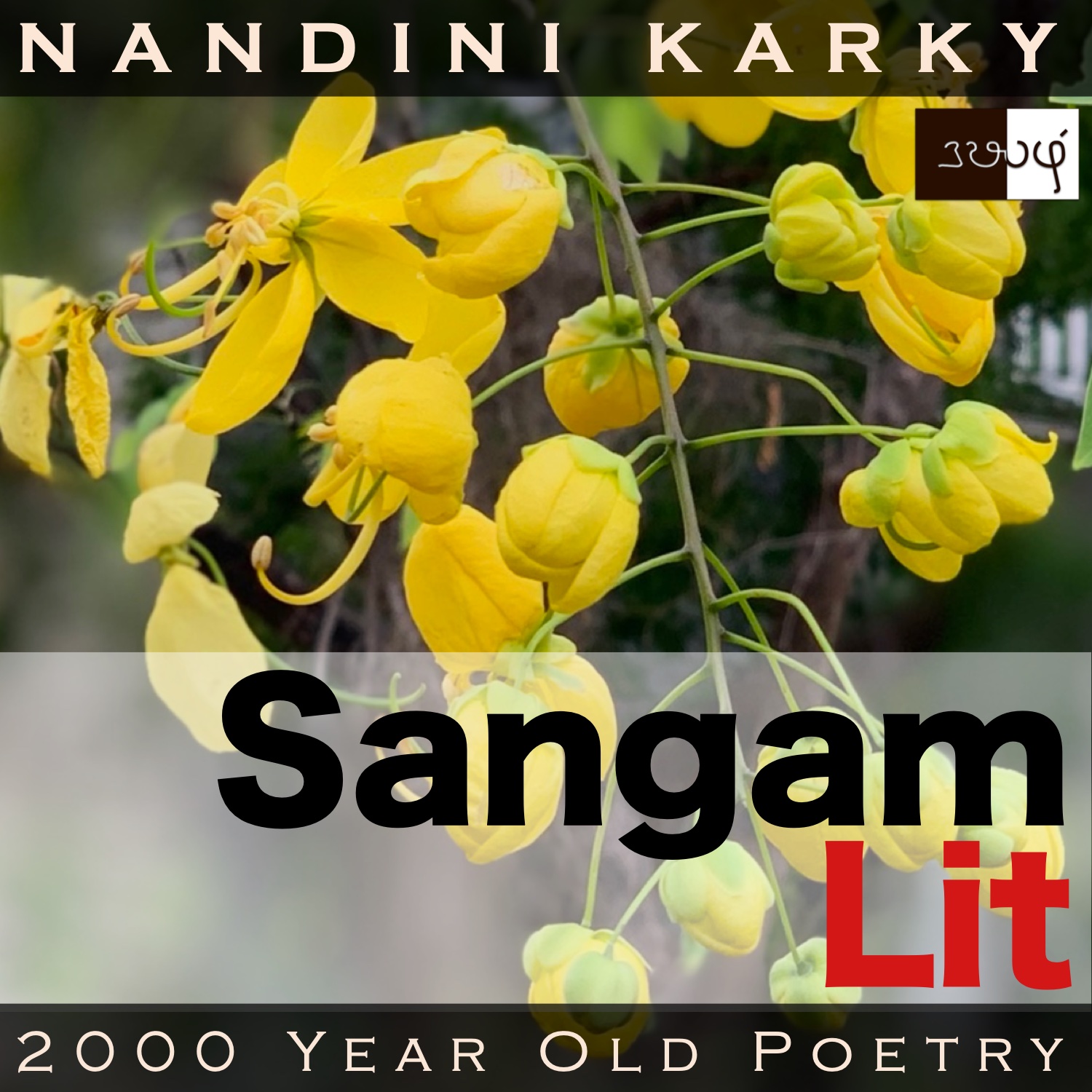Podcast: Play in new window | Download
Subscribe: Apple Podcasts | Spotify | Amazon Music | Android | iHeartRadio | TuneIn | RSS | More

In this episode, we observe the changes in the weather and the effect it has on minds, as portrayed in Sangam Literary work, Natrinai 371, penned by the renowned female poet, Avvaiyaar. Set in the forests of ‘Mullai’, the verse speaks in the voice of the man to his charioteer, conveying the need to rush homeward.
காயாங் குன்றத்துக் கொன்றை போல,
மா மலை விடர் அகம் விளங்க மின்னி,
மாயோள் இருந்த தேஎம் நோக்கி,
வியல் இரு விசும்பு அகம் புதையப் பாஅய்,
பெயல் தொடங்கினவே, பெய்யா வானம்:
நிழல் திகழ் சுடர்த் தொடி ஞெகிழ ஏங்கி,
அழல் தொடங்கினளே ஆயிழை; அதன் எதிர்,
குழல் தொடங்கினரே கோவலர்-
தழங்கு குரல் உருமின் கங்குலானே.
The verse opens with ‘காயாங் குன்றத்துக் கொன்றை’ meaning ‘golden shower flowers on a peak filled with Ironwood trees’ and underscores two of the native trees found in the Western Ghats, in the states of Tamilnadu, Kerala and Karnataka. The phrase ‘மாயோள் இருந்த தேஎம்’ talks about ‘the direction where the dark-skinned girl lives’ and subtly echoes the adoration of dark skin in a woman then. ‘பெயல் தொடங்கினவே’ signifies the core of the verse, which is ‘the rains have started’. Next, we perceive the frequently mentioned symptom of ‘longing that makes bright bangles slip away’ as seen in the phrase ‘சுடர்த் தொடி ஞெகிழ ஏங்கி’. The phrases ‘அழல் தொடங்கினளே’ meaning ‘she has started crying’ and ‘குழல் தொடங்கினரே’ meaning ‘they have started their lutes’ throb with dynamism, echoing the series of actions unfolding therein. Ending with ‘தழங்கு குரல் உருமின் கங்குலானே’ meaning ‘the roar of thunder at midnight’, the verse invites us to listen intently.
The man and lady had been leading a happy, married life when the man had to part away on a mission. Before he leaves, he promises to return before the rainy season. While on his job, he remains fully focused on it and when he is finally done with it, his heart turns homeward. Just then, he tells his charioteer, “Akin to the burst of ‘kondrai’ flowers amidst the ‘kaya’ trees on a peak, lightning flashes in the clefts of the huge mountain ranges. In the direction, where my dark-skinned lady resides, vast and dark clouds that hide the skies pounce onward, and so, the rainless skies have started their downpour. Yearning such that her luminous, bright bangles slip away, my bejewelled lady has started crying. Adding to that, the cowherds have started playing their lutes too, which to her, speak with the voice of roaring thunder in the midnight hour.” With these words, the man expresses the urgency with which they have to travel towards the lady, now that the promised season of return has arrived.
Time to delve into the nuances! The very first image is an aerial shot of a mountain peak which is densely covered with ‘kaya’ trees interspersed with ‘kondrai’ trees. To tell you a little more about these trees, the ‘kaya’ tree blooms with bright blue flowers and the ‘kondrai’ blooms with bright yellow flowers, which we have seen equated to ‘gold’ in many Natrinai poems. Now imagine, streaks of gold amidst the blue! Whatever that may bring to our modern minds, the man in the verse places that as a simile for lightning streaking in the blue sky. He talks about how the flashes of lightning make even the mountain crevices glow. Then, he points to the thick cloud cover that make the skies vanish out of sight and the way they seem to be pouncing in the direction of where the lady lives. The man states emphatically about how the rainless skies have decided it’s time to pour down. Following this, the man’s mind travels to where the lady lives and sees how her bangles are starting to slip away in pining, now that the rains have started. He also knows, to make her pain worse, the cowherds too will start playing on their lutes in the evening hour, which he feels will sound like midnight thunder in the lady’s ears!
Exquisite how the song begins with lightning flashing, etched by the sketch of ‘kondrai’ amidst the ‘kaya’ flowers, and ends with thunder resounding, echoed by the music of the cowherds’ lutes. And, within the delay between lightning and thunder, the story of a patient lady’s wait and her pain is vividly told in the concerned voice of her man. As the rains, tears and lutes are starting, you too, must start our ride back home, the man seems to say to his charioteer, and conveys the wish in his heart to beat those forces of nature, propelled by the power of his love!




Share your thoughts...